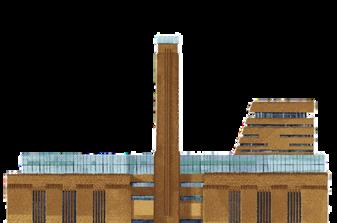F a d y A b d e l m a l a k & P h i l i p p e H e m p e l | U V A i n E n g l a n d : I R C i n L o n d o n & O x f o r d | 2 0 2 5
Tate Modern


F a d y A b d e l m a l a k & P h i l i p p e H e m p e l | U V A i n E n g l a n d : I R C i n L o n d o n & O x f o r d | 2 0 2 5

19471963
The Bankside Power Station, built on the south side of the River Thames just across from St Paul's Cathedral, served a vital role in London’s industrial era It was constructed in two phases, and designed by architect Sir Giles Gilbert Scott
In 1992, Tate Trustees announced intentions to build an exhibit in London for international modern and contemporary art
In 1994, the Bankside Power Station was chosen for the site, and one year later, Swiss architects Herzog & De Meuron began work on designing the conversion 19921995
In 1996, the final plans for the Tate Modern were unveiled, and the site was officially purchased before construction began shortly thereafter
The total project costs equated to approximately £134 million and construction was completed in January 2000. 19952000
The Tate Modern was officially opened to the public in May of 2000, marking a significant milestone during the turn of the century
Since it’s initial opening, the gallery has become a landmark of London and a top tourist attraction, having welcomed over 40 million visitors
With the success of the Tate Modern, the exhibit undertook a significant expansion in 2009 Old oil tanks from the former power station were converted into more gallery space, as well as other new amenities including: The Switch House, The Tate Exchange, Panoramic Viewing Level, and overall improved visitor facilities



The former turbine hall in which massive electrical generators were housed inside the Bankside Power Station has been converted into a massive gallery space with rotating exhibits “Mire Lee: Open Wound” is the current work featured until March 16, 2025, and is a wonderful example of modern art being contrasted in an industrial and historic building
These large circular rooms were once used as underground oil tanks for the turbine generators In the 2009 renovation, they were converted into live performance spaces, used for dances, films, and discussions. You can still see the rough concrete walls that highlight the industrial past of the gallery

One of the most notable external features of the Tate Modern is the chimney that was constructed as part of the former Bankside Power Station. This feature has been primarily left in tact and still stands as the tallest point, although not accessible from the inside or serving any function anymore.

i n L o n d o n & O x f o r d | 2 0 2 5
F a d y A b d e l m a l a k & P h i l i p p e H e m p e l | U V A i n E n g l a n d : I R C